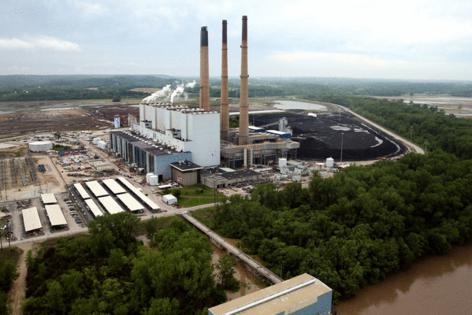Ameren in hot seat after new EPA rules target coal plant emissions
Published in Business News
ST. LOUIS — Regional electric monopoly Ameren could be hit harder than many U.S. utilities by new federal rules requiring carbon pollution controls on coal-fired power plants.
The company generates more than half of its power from coal, helping Missouri burn more of the material than any state but Texas. And the utility's biggest power plant, the Labadie Energy Center in Franklin County, accounts for the second-most greenhouse gas emissions of any coal plant in the country.
Ameren said it would take the coming weeks to "closely review new regulations," according to a statement from Craig Giesmann, the utility's environmental services director.
"We will take the necessary time to study it before determining any potential compliance requirements or schedules," he said.
On Thursday, the Environmental Protection Agency announced a suite of new rules that take aim at both air and water pollution from power plants that run on fossil fuels — including one policy that would require coal-fired plants to capture their greenhouse gas emissions.
Plants that aim to operate beyond 2039 would have to cut or capture 90% of their carbon dioxide emissions by 2032, the EPA said. Those that expect to be retired by 2039 would still have to capture some emissions. Plants set to retire by 2032 wouldn't need the emission controls.
The EPA said its analyses show the new power plant rules "will deliver hundreds of billions of dollars" in climate and health benefits — far outweighing compliance costs.
Experts say the new rules are sure to face challenges in court. But they won't dramatically change the trajectory of the nation's aging coal fleet, some say, with remaining plants already exceeding or nearing the end of their lifespans by the time the new requirements take effect.
"The American coal fleet is very old," said Emily Grubert, a professor of sustainable energy policy at the University of Notre Dame. "Most coal plants in the United States are so old that you would probably expect them to shut down by 2035, in any case."
Others agreed that the new rule is essentially "pushing a door that's already open," said Michael Webber, an energy resources and mechanical engineering professor at the University of Texas. He said the rule presents coal plants with a "retrofit or retire" ultimatum that will likely mean more closures rather than massive new investments in the plants.
...continued
©2024 STLtoday.com. Distributed by Tribune Content Agency, LLC.







Comments